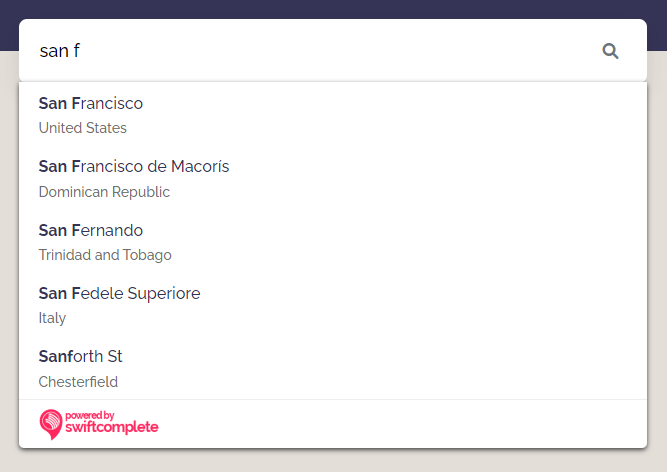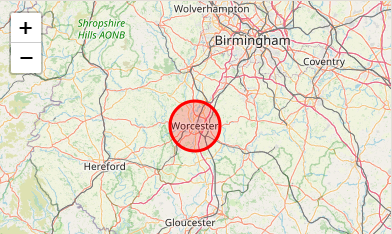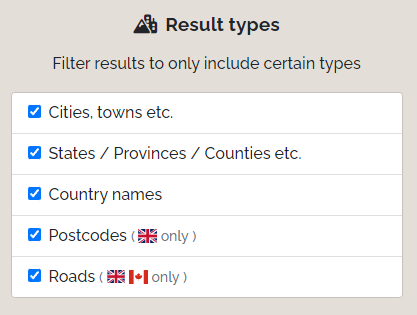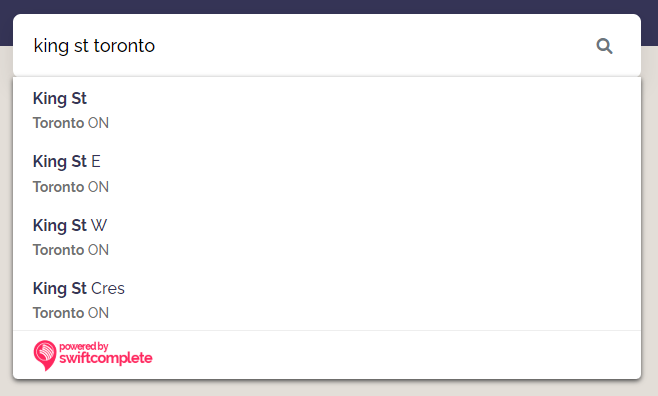We're pleased to announce the release of the Swiftcomplete Global Places API, featuring:

The Global Places API is extremely flexible and can be used for general location searching, geocoding and data cleansing, either globally or for a list of specific countries (for address validation and postcode lookup, please check our Address Autocomplete service).
From today, customers already using our existing service in Great Britain can upgrade to the Global Places API for worldwide coverage by creating a new Places API key.
The Global Places API is ideal for when you want to capture user's general location, and receive structured location information and coordinates for routing or plotting on a map.
Some use-cases include building store locators (finding the nearest click and collect point to a place or postcode), adding a city autocomplete to a contact form or extracting locations from blocks of text, but the flexibility of the API makes it easy to create your own bespoke location integration.
The API allows worldwide cross-border searching without needing to preselect a country. It's possible to restrict searching to either just one country, or a list of countries by passing in a list of country codes.
Highly scalable worldwide searching is made possible by the new Swiftcomplete Location Platform.
Location biasing increases relevance by automatically prioritising results near the user's current location, determined by their IP address.

At a basic level this means that someone in the UK would find London first, whereas someone in Australia would see Sydney first. We use a unique combination of distance, relative importance and relevance to generate the best possible results and minimise the amount of searching required.
It's also possible to pass in a latitude, longitude to prioritise results near a specific point, rather than the user's approximate current location.
Result filtering can be used to limit searching to specific types of results.

Restrict searching to one category (e.g just cities), or any combination of categories (e.g. country names and states). Fine-grained control is available through the API.
The combination of restricting searching to specific types of results in certain countries, prioritised to near the user's location makes it possible to significantly improve the user experience when searching for places around the world.
The service has worldwide coverage for:
Additionally, there is enhanced data available in certain countries:

All data includes coordinates, and we are currently preparing streets, postcodes and public transport data for other countries outside of Canada and Great Britain. Our aim is to expand enhanced datasets globally (subject to data availability).
The service can be integrated either using a ready-made JavaScript autocomplete integration, or directly through the API.
Full documentation for the Global Places API is now available, with code samples and guides to help you get started.
Try the interactive demo on the main Global Places API page, and see how location biasing and result filtering can be used to create a flexible location search tool.
New customers can create a free Swiftcomplete account for a 14 day free trial for developing with the API.
If you're an existing customer and would like to try the new service, let us know and we'll be happy to add some free trial credits to your account.
If you have any questions, suggestions or feedback on the latest release, get in touch or start a live chat session when we're online.
For updates on our latest services, follow us on Twitter or LinkedIn.